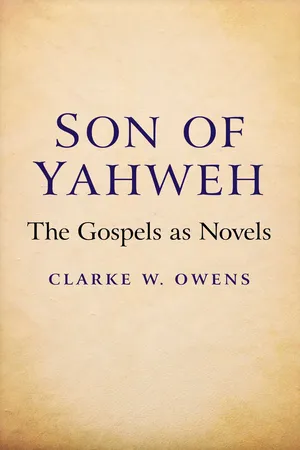
- English
- ePUB (mobile friendly)
- Available on iOS & Android
eBook - ePub
About this book
Anyone who has ever spent time in a Christian church knows that the gospels are never read as a series of ordered events forming a narrative whole. Instead they are read with dogged incoherence, focusing on tiny snippets taken out of context. The birth stories of Matthew and Luke are emphasized at Christmas; the stone rolls away from the tomb at Easter. The gospels are used in churches only as occasional readings, lections, chapters and verses which are dipped into for liturgical moments. If we understand them that way, it makes no difference whether Peter and John observe Jesus raising a dead girl in one chapter and in the next seem dumbfounded by the very concept of resurrection. That juxtaposition is dramatically incoherent only if we assume that meaning derives from the order of events in a story that is read as a whole; that is, as a literary fiction. Reading the gospels as novels raises questions about how we think of fiction, how we think of history, and how we think of religion. Critical reading opens windows to truth claims at basic levels: the level of the definition of the text, the level of when and how it was composed, the level of form or genre. These are questions for the literary critic, and they lead to factual conclusions, including the author's conclusion that crucifixion and resurrection are allegories for the destruction of Jewish culture in Jerusalem in 70 C.E. and the rebirth of that culture in the form of a Hellenized and de-tribalized Judaic offshoot, Christianity.
Frequently asked questions
Yes, you can cancel anytime from the Subscription tab in your account settings on the Perlego website. Your subscription will stay active until the end of your current billing period. Learn how to cancel your subscription.
No, books cannot be downloaded as external files, such as PDFs, for use outside of Perlego. However, you can download books within the Perlego app for offline reading on mobile or tablet. Learn more here.
Perlego offers two plans: Essential and Complete
- Essential is ideal for learners and professionals who enjoy exploring a wide range of subjects. Access the Essential Library with 800,000+ trusted titles and best-sellers across business, personal growth, and the humanities. Includes unlimited reading time and Standard Read Aloud voice.
- Complete: Perfect for advanced learners and researchers needing full, unrestricted access. Unlock 1.4M+ books across hundreds of subjects, including academic and specialized titles. The Complete Plan also includes advanced features like Premium Read Aloud and Research Assistant.
We are an online textbook subscription service, where you can get access to an entire online library for less than the price of a single book per month. With over 1 million books across 1000+ topics, we’ve got you covered! Learn more here.
Look out for the read-aloud symbol on your next book to see if you can listen to it. The read-aloud tool reads text aloud for you, highlighting the text as it is being read. You can pause it, speed it up and slow it down. Learn more here.
Yes! You can use the Perlego app on both iOS or Android devices to read anytime, anywhere — even offline. Perfect for commutes or when you’re on the go.
Please note we cannot support devices running on iOS 13 and Android 7 or earlier. Learn more about using the app.
Please note we cannot support devices running on iOS 13 and Android 7 or earlier. Learn more about using the app.
Yes, you can access Son of Yahweh by Clarke W. Owens in PDF and/or ePUB format, as well as other popular books in Theology & Religion & Middle Eastern History. We have over one million books available in our catalogue for you to explore.
Information
Topic
Theology & ReligionSubtopic
Middle Eastern HistoryTable of contents
- Cover
- Title Page
- Copyright
- Contents
- Acknowledgements
- Dedication
- Introduction
- Chapter 1. Literary Criticism and the Historical Jesus
- Chapter 2. Matthew
- Chapter 3. Luke
- Chapter 4. John
- Chapter 5. Mark
- Chapter 6. The Fantastic History of the Apostles
- Chapter 7. A Vague Apocalyptic?
- Chapter 8. Conclusion
- Notes
- Works Cited